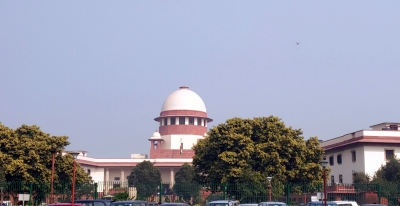SC gives overlooked judges an English lesson while dismissing plea
By IANS | Published: September 4, 2020 08:22 PM2020-09-04T20:22:15+5:302020-09-04T20:35:35+5:30
New Delhi, Sep 4 The Supreme Court on Friday handed out some lessons in English and also cited ...

SC gives overlooked judges an English lesson while dismissing plea
New Delhi, Sep 4 The Supreme Court on Friday handed out some lessons in English and also cited the Cambridge Dictionary to contextualise the interpretation of clauses under an Article of Constitution, as it dismissed a petition filed by eight judicial officers from Tamil Nadu challenging their non-consideration for elevation to the Madras High Court by its Collegium.
The petitioners moved the apex court, stating that despite being the senior-most in the cadre of district judges, they have been overlooked and their juniors were recommended for elevation to the High Court as judges. This was done by the Collegium of the High Court solely on the application of explanation (a) under the Constitution's Article 217(2), argued the petitioners, who wanted their experience as advocates to be considered along with the service rendered by them as judicial officers, for determining their eligibility.
A bench of Chief Justice S.A. Bobde and Justices A.S. Bopanna and V. Ramasubramanian explained the minute details associated with usage of English language in the connection with the interpretation of the Article contested by petitioners.
The bench explained the difference between words "has held" and "has been" which appear repeatedly in Article 217(2).
"In relation to a person from the category of judicial service, sub clause (a) uses the words 'has held'. But in relation to a person from the category of advocate, sub clause (b) uses the words 'has been'.
"This is quite relevant for the reason that even in explanation (a) and (aa) the words 'has held' always preceded the words 'judicial office' and the words 'has been' always preceded the word 'advocate'. In common parlance, the words 'has held' stand in contra distinction to the words is holding or has been holding", said the top court.
Citing Cambridge Dictionary's explanation on the usage of "has been", the bench said: "The Cambridge Dictionary states that the words 'has been' are in present perfect continuous form. The Dictionary says that we may use the present perfect continuous, either to talk about a finished activity in the recent past or to talk about a single activity that began at a point in the past and is still continuing."
The bench said keeping this in mind, explanation (a) confers the benefit of clubbing, to a limited extent, to a person who has held a judicial office. To be eligible for the limited benefit so conferred, a person should have been an advocate "after he has held any judicial office".
"There is no confusion either in the language of Article 217(2) or in our mind," added the bench.
The bench noted that Article 217(2) does not guarantee any one with the right to be appointed as a judge of the High Court. "In a way, a person holding a judicial office is better placed, as he is assured of a career progression (though in a limited sense) after being placed in something like a conveyor belt. There is no such assurance for an advocate. Therefore, the argument based upon Article 14 does not impress us," said the bench.
In 2017, the Madras High Court Collegium had ignored petitioners' names, and instead recommended officers who were junior to them for appointment as judicial officers in the cadre below that of district judges. After long service, they gained promotion to the post of district judges. But their promotion happened after the date on which the petitioners were directly recruited as district judges. Therefore, the petitioners became seniors to the respondents.
The petitioners argued that Article 217(2) of the Constitution, which deals with the qualifications required for a person to be appointed as a High Court Judge, has been incorrectly interpreted.
But the court was not convinced.
"We are of the considered view that the claim of the writ petitioners is wholly untenable and the writ petition is misconceived. Hence, the writ petition is dismissed," said the top court.
( With inputs from IANS )
Disclaimer: This post has been auto-published from an agency feed without any modifications to the text and has not been reviewed by an editor
Open in app